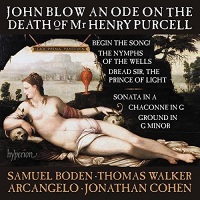Texte paru dans: / Appeared in: |
|
|
Outil de traduction ~ (Très approximatif) |
|
|
Reviewer: Barry
Brenesal Bruce Wood’s liner notes to this release properly refer to John Blow (1649–1708) as “one of the greatest of not-quite-forgotten English composers.” Just how marginalized he is today in our classical firmament is well illustrated by a friend of mine who, a number of years ago, inquired after I played him a few songs of Blow featuring Emma Kirkby: “Wasn’t he that fella who gave up a big job for Purcell because the latter was a genius, and he was a second-rater?” Blow did generously yield a few of his public positions to students and colleagues who needed the income, though it has to be noted that he lost little in the process, as whatever time he freed up was immediately swallowed by composition. But he was not inferior to Purcell; and the fact that his works are not well known in most quarters today is not Blow’s fault, but a result of cultural distance. We as classical listeners and concertgoers feel closer to the keyboard, theatrical, and consort music of Purcell than to the ceremonial odes and Anglican devotional music that formed such a large portion of Blow’s oeuvre. In these genres Blow was unsurpassed, and his efforts await general rediscovery. This album comprising four of his odes provides as fine an introduction to his talents as one can find in the CD catalog. Begin the Song, composed for St. Cecilia’s Day in 1684, is a festive, ambitiously varied work that demonstrates the range of Blow’s contrapuntal skill in this form, as well as his gift for plaintively moving melody. An Ode on the Death of Mr. Henry Purcell is easily the best-known work on the album, and justifiably so, given its vein of quietly melancholy lyricism. The Nymphs of the wells is an intimate ode whose songs and duets reveal what Verdi many years later would refer to in each of his operas as a distinctive tinto. By contrast, Dread Sir, the Prince of Light, a court ode and the most ceremonial work on the album, is a mix of magisterial choral statements, brilliantly imitative counterpoint, and triple meter dances such as Charles II favored, served with a harmonic piquancy that remains in the mind. Three chamber works form breaks between the odes. Blow’s sonata is a pleasantly relaxed piece that recalls the greater organized, less improvised sonatas of the second generation stile moderno. The Chaconne and Ground in turn follow models of repetitive harmonic statement that first spread from Italy in the 16th century to great popularity. The writing is ingenious, especially so in the Chaconne, where Blow uses later variations to explore expressive harmonic territory. My only previous review of Arcangelo was of its recording of Couperin’s L’aposthéose de Lully and Leçons de ténébres (Hyperion 68093; Fanfare 41:1). The performances were excellent, though the L’aposthéose was sabotaged by distant, over-reverberant engineering. That’s not the case on this release. The variably sized ensemble is represented instrumentally by five strings, two recorders, and three continuo musicians, while vocal matters are entrusted to another eight performers. All too typically in Baroque and pre-Baroque music, mixed ensembles such as these feature excellent instrumentalists and questionable singers, but that’s not the case here. While the chamber selections are dispatched with sweet tone, technical ease, and a spirited, light touch, the vocalists are exceptional. I’d single out tenor Thomas Walker in particular for phrasing knowledgeably and enunciating well in “So ceas’d the rival crew” from the Purcell Ode. Jonathan Cohen clearly limns Blow’s buoyantly danceable rhythms, yet maintains a reasonably fluid pacing in recitative and arioso passages. In Huntley Dent’s engaging phrase (to a review of Arcangelo’s performance of the Mozart First and Fifth Violin Concertos on Warner 2564627677; Fanfare 38:6), “There’s no question of academic whiskers or dogma; this is exquisite musicianship all around.” I would note that the Ode on the Death is taken at a somewhat brisker tempo than most I’ve previously heard, either live or on disc. It is by no means a scramble for the finish line, but slower harmonic movement tends to bring out more of the expressive quality of the work. (A good example is the version recorded by Philippe Pierlot and the Ricercar Consort on Mirare 109, though its pair of vocalists sound a bit colorless when compared to Walker in particular.) This should be set against the fact that there are no modern recordings in print of the other three odes.
This is a
first-rate album, then, a tribute both to its performers and the inspired
compositions of John Blow. In excellent sound, it comes highly recommended.
| |
|
Support us financially by purchasing this disc from eiher one of these suppliers. Un achat via l'un ou l'autre des fournisseurs proposés contribue à défrayer les coûts d'exploitation de ce site. |
|
|
|
|
|
Cliquez l'un ou l'autre
bouton pour découvrir bien d'autres critiques de CD |
|




